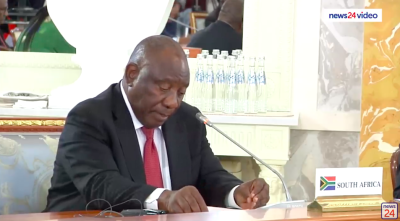Africa’s 10 Point Peace Plan: Mission: President Cyril Ramaphosa

All Global Research articles can be read in 51 languages by activating the Translate Website button below the author’s name.
To receive Global Research’s Daily Newsletter (selected articles), click here.
Click the share button above to email/forward this article to your friends and colleagues. Follow us on Instagram and Twitter and subscribe to our Telegram Channel. Feel free to repost and share widely Global Research articles.
***
Forty minutes into the meeting between President Cyril Ramaphosa – along with six other African presidents and government leaders – and Russian President Vladimir Putin, the live feed broadcasting the talks was cut.
The African heads of state met with Putin on Saturday after meeting with Ukraine President Volodymyr Zelensky in a delegation participating in the Africa Peace Initiative for peace talks.
The meeting, at the Marble Hall in Konstantinovsky Palace, St Petersburg, began with an address by the presidents, with Putin cutting in before he was set to speak at the end of the address.
Putin interjected after Ramaphosa had spoken, after which the live feed was cut.
News24 assistant editor for investigations Pieter du Toit noted that there were no independent South African journalists with the president, and it was thus impossible to accurately report the remarks by Ramaphosa and Putin of events as they unfolded.
Du Toit remarked:
Du Toit was part of a contingent of journalists and security personnel left stranded at Warsaw’s Chopin Airport for more than 26 hours, while the president was in Ukraine.
The delegation was not able to get to Russia with the president either.
Along with Ramaphosa, the African peace delegation included Senegalese head of state Macky Sall, Zambian President Hakainde Hichilema and Comorian President Azali Assoumani, as well as leaders from Uganda, Egypt and Congo-Brazzaville.
It is not yet known what happened after the feed cut off, but before it did, Ramaphosa, who was leading the delegation, outlined at least 10 points to help end the war.
These points were also delivered to Zelensky.
- That the African delegation listens to and understands both the Russian and Ukrainian perspectives on the war;
- The war must be settled and ended with negotiations;
- A de-escalation of conflict on both sides;
- That Africa recognises the countries’ sovereignty and believes all parties should work in terms of internationally recognised principles;
- There need to be security guarantees;
- Call for opening up of movement of grain shipments through the Black Sea and into Africa;
- Grant humanitarian aid to all those suffering because of the conflict;
- Free all prisoners of war on both sides;
- Repatriate all children displaced by the war;
- There should be post-war reconstruction, and
- Further negotiations to end the war, with Africa contributing.
Ramaphosa said the war was negatively affecting countries in Africa and across the world because the price of commodities had increased.
He specifically mentioned grain, fertiliser and fuel.
After his address, Putin cut into the presentations before the other heads of state could address him.
He said he had some comments to make, including his claims that the crisis in Ukraine began in 2014 because of a coup d’état.
He said the Ukrainian people did not accept this coup and that Russia had to support these people.
Putin blamed the West for many of the issues in Ukraine, and said it was the West and not Russia that caused the sharp increase in food costs.
Lecturing the officials, Putin added that Russia was happy to negotiate with Ukraine, but that it was Ukraine that did not want to negotiate.
What Putin referred to as a “coup” was an uprising against the pro-Russian former president of Ukraine, Viktor Yanukovych, after a rigged election. A democratic election followed this, and a new Ukrainian president was elected.
According to a report by the European Union, Ukraine is a leading grain exporter, and the war has resulted in food security concerns for millions of people worldwide.
*
Note to readers: Please click the share button above. Follow us on Instagram and Twitter and subscribe to our Telegram Channel. Feel free to repost and share widely Global Research articles.
Featured image is a screenshot from the video

